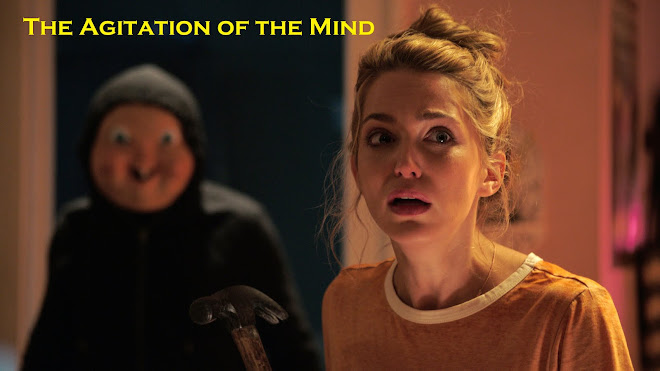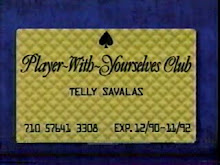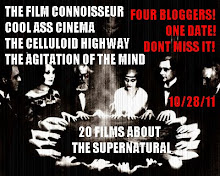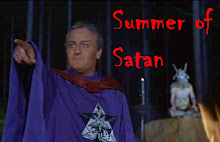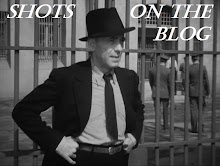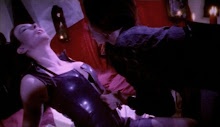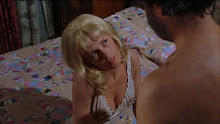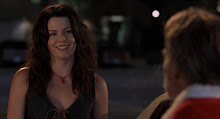Friday, March 30, 2018
Hot Girls Wanted
When Hegel observed that the past repeats itself, Karl Marx added the famous caveat “the first time as tragedy, the second time as farce”. To subject oneself to the hour twenty minutes of Jill Bauer and Ronna Gradus’s documentary ‘Hot Girls Wanted’, produced by singer and actress Rashida Jones, is to witness tragedy and farce awkwardly intertwined, both of them trying to pretend they’re enjoying it, while keeping one eye locked on their Instagram feeds and desperately hoping for another dozen likes.
Sticking with the Karl Marx theme for another paragraph, he and Friedrich Engels’ revolutionary political manifesto started with the words “a spectre is haunting Europe – the spectre of Communism”. Likewise, a spectre is haunting ‘Hot Girls Wanted’ – several spectres, in fact. Actually a whole fucking graveyard full of them. Shiver at the Ghost of Abject Narcissistic Stupidity! Gasp at the Ghost of Obsessive Social Media Inanity! Try not to piss your pants at the Ghost of Monumental Self-Delusion! (That’s piss your pants laughing, by the way, not piss your pants because it’s scary.)
There is, however, one spectre missing from the soul-crushingly interminable 80 minutes of this flick – and that’s the very spectre Bauer, Gradus, Jones and writer Brittany Huckaby went ghosthunting for in the first place.
The project started out as an investigation into male campus attitudes towards, and consumption of, online pornography (because God bless the internet that the youth of today no longer have to scrutinise a video store carpet while scarlet patches spread across their cheeks as they hand over to the matronly clerk an empty VHS case with a cover image of Nina Hartley about to steer some girl-next-door type down the rue de Sapphos), only to realise that the aforementioned girl-next-door types accounted for the majority of these thick-necked jocks’ viewing preferences: a hand-shandy subgenre known as “amateur porn”.
Thus it was that Bauer and Gradus and Jones and Huckaby, old Uncle Tom Netflix and all, went haring off in pursuit of these (mostly) teenage adult entertainment ingénues. The resulting documentary merited (that’s “merited” as in “was inexplicably on the receiving end of”) some festival buzz, even though early audiences felt that it lacked focus. Viewers and filmmakers batted their opinions around on Twitter while the auteur theory crawled into a hole and died. Re-edits occurred.
I’ve not had the opportunity to view the original cut, so I can’t say how it differs from the version now floating around near the scuzzy plughole of Netflix, but I can only assume that if the cut I watched was the one with all the focus and clarity, its erstwhile incarnation must have been headfuck incoherent on the level of David Lynch and Alejandro Jodorowsky going on a two-week bender during which they summoned the ghosts of Aleister Crowley and Jim Morrison via a ouija board whose letters were in Croatian and whose numbers roughly correlated with the Mayan calendar.
‘Hot Girls Wanted’ is a clusterfuck on pretty much every level, but the essence of its clusterfuckery is Bauer and Gradus’ inability to find a tone, a context – hell, even a fucking point – to their film. At base level, you could précis it as the failure to bridge its Presbyterian disapproval at the depravity its subjects throw themselves into with its you-go-girl insistence on defending to the death (or at least a flesh wound) their right to do it in the name of empowerment, feminism, Belle Knox or the flying spaghetti monster.
Belle Knox, the so-called “Duke University porn star” (a weird conflation of alma mater and something-that-has-nothing-to-do-with-alma-mater that must make me the Bluecoat Sixth Form College sarcastic motherfucker), haunts the periphery of this film; and, given her soundbite-friendly eloquence and its-my-story-and-I’m-sticking-to-it pseudo-feminist narrative, you get the impression that she’s the person Bauer and Gradus would rather be making a film about. Sadly, though, they have to satisfy themselves with a short clip from Knox’s toe-curling interview with professional British skeaze-meister Piers Morgan and an even shorter clip (mercifully) from one of her “facial abuse” videos.
Bauer and Gradus also have to make do, in terms of interview subjects, with Tressa (porn name: Stella May*), Rachel (porn name: Ava Taylor), Michelle (porn name: Brooklyn Daniels**), Karly (porn name: Lucy Tyler) and Jade (Ava Kelly). Their ages range from 18 to 25, though Jade at 25 is edging out of the girl-next-door market and forced to do more “specialist” videos. Bauer and Gradus capture her response at being asked to dress appropriate for a “ghetto” shoot. She cannot believe, she avers, that “there are guys who go to a pawn shop and they’re like ‘I wanna fuck that girl’,” and having delivered this value judgement against some poor shmuck reduced by circumstances to hocking his worldly goods for far less than they’re worth, she toddles off to the same kind of degrading experience Knox put herself through – she’s verbally abused, spat on, slapped around and much much worse – all for the same devalued handful of greenbacks.
The startling coda to this scene is her rationalisation that essentially being raped on camera means that guys who get their jollies from this kind of thing will sate themselves watching it happen to her rather than “doing it to a real girl”. Jade’s dissociation of herself from any recognisable set of values is the film’s emotional nadir and flies in the face of the my-choice-my-empowerment spin Bauer and Gradus desperately try to hammer home elsewhere. It does, however, provide an interesting point of contrast to Karly, who reads intellectually stimulating books on her days off and has created “Lucy Tyler” not as a pseudonym but an alter-ego: she subtly changes her appearance and behaves differently in order to become Lucy, and shrugs off the character after the shoot is over. Bauer and Gradus were handed a pint-sized nucleus of potential in Karly, and a version of ‘Hot Girls Wanted’ that focused on her methodology for surviving the industry and retaining her self-identity could have been fascinating, particularly in counterpoint to Jade’s horrifying naivety.
But no: the filmmakers went with Tressa and Rachel as their primary focus. Granted, there were avenues that could have been explored with both of them. Rachel is introduced during her first few days in the business, blinged up and not exactly rocking a beanie hat, chuffing on a cigarillo and attempting to freestyle. This is the affront to linguistics that she comes up with:
Yeah, you’re a porn star
And I’m a fucking shooting star, bitch
And now we’re going to LA
And we’re gonna sip Bombay
Yeah, and I’m smokin’ hella blunt
Yeah, and I got hella cunt, yeah
(She’s white, by the way.) Now contrast this muppet babies version of hardcore with her interview following her first shoot: “Ugh, I got macked on by some creeper,” a statement delivered with all the wide-eyed incredulity of someone who honest-to-God thought that a life in adult features would require little more than some naked orgiastic motion-capture writhing and all the nasty, squelchy, gooey stuff would be added in later by CGI. Bauer and Gradus try this trick more than once, banging the drum re: the horrible reality of pornographic features, then undercutting themselves by citing research – specifically carried out for the film – that identifies extreme and violent porn (such as the “facial abuse” subgenre Belle Knox and Jade were victims of) as being prominently advertised on porn sites.
Ultimately, none of the interview subjects in ‘Hot Girls Wanted’ present as being in the dark about what awaits them (although they bullshit each other to an almost cruel degree as to how easy the lifestyle is: a frequently peddled myth is that “the guys treat you like princesses”), which doesn’t leave Bauer and Gradus with a lot of room to pattern a victim narrative (they do their best, though). Whenever the issues of complicity or responsibility rear their heads, the filmmakers hastily swerve in the direction of why-do-these-poor-girls-do-this, and in needing to grasp onto this aspect of the story they inadvertently make Tressa the main focus of the documentary.
So what does Tressa need to get away from so desperately? Um, a comfortable suburban home, a mother who’s proud of her academic and cheerleading achievements and a father who enjoys spending time with her, it would seem. Sure, her ma’s a bit of a couch potato, and her dad likes firing off shotguns, but neither of them come across as the kind of controlling, suffocating or domineering types that one’s only option is a flight to Miami and so much sex with hatchet-faced tattooed douchebags that one develops a vaginal cyst.
The clue to Tressa’s psychological make-up has more to do with an obsession with image. I was about to say self-image, but that makes it seem too profound. Let’s just use the word “selfie” instead. Tressa comes across as an entity virtually inseperable from her cellphone or laptop. Every phone call she makes is a face-time pout opportunity. She goes on a date to the zoo with her limp dick loser boyfriend (“you’re not a prostitute to me” he says at one point, dejection spray-painted across his hangdog face) and tunes out of his conversation, so focused is she on filming herself. And again, an avenue presents itself to Bauer and Gradus – the fledgling porn star as a product of the social media age – but they lack either the interest or the ability to pursue it.
If Jade’s humiliation at the “facial abuse” shoot is the tragedy part of ‘Hot Girls Wanted’, Tressa’s return to the parental abode – limp dick boyfriend in tow – is the farce. In a volte-face that plays out like the worst Hollywood melodrama, the combination of her parents’ disappointment and her boyfriend’s general deficiency of manliness lead her to a disavowal of her short-lived porn star past. “I only made twenty-five thousand dollars in four months,” she opines, “and when I came home I had two thousand left in the bank.” That she applies “only” to the twenty-five thousand not the two says something I could probably write another few paragraphs about, but the hour is late, the review already overlong, and further speculation on Tressa and co. frankly not worth the effort.
‘Hot Girls Wanted’ is a documentary whose title all but instructs you to ready your palm for some onanistic activity, only to compel you to smack it repeatedly against your forehead instead.
*Perhaps the only example of the porn name being classier than the actual name.
**Decided on after she’s encouraged to “think of a place you like”, which is like a male London porn star alighting on the pseudonym Brixton Hardd.
Labels:
documentary,
Jill Bauer,
Rashida Jones,
Ronna Gradus
Sunday, March 25, 2018
CROWHURST SEASON: wrap-up
When StudioCanal acquired Simon Rumley’s ‘Crowhurst’ – even though they were already distributing higher-budgeted rival film ‘The Mercy’ – there was speculation that they were protecting their interests as regards the latter and that Rumley’s film would effectively be quashed. StudioCanal nonetheless announced that ‘Crowhurst would open “four to six weeks” after ‘The Mercy’.
Well, those four to six weeks have disappeared over the horizon and although ‘Crowhurst’ has received a couple of (complimentary) reviews in the broadsheets, there’s been neither sight nor sound of it at any cinema anywhere near your humble blogger. So my objective of wrapping up Crowhurst season on The Agitation of the Mind with an in-depth review of Rumley’s take on the enigmatic story of Donald Crowhurst is basically bollocksed.
Nor did I manage to track down a copy of Christian de Chalonge’s ‘Les quarantièmes rugissants’ (‘The Roaring Forties’) or the BBC documentary ‘Donald Crowhurst: Sponsored for Heroism’. I found Nikita Orlov’s ‘Gonka Veka’ (‘The Race of the Century’) online, but in a print that wasn’t subtitled, and while it was a solidly made piece of work that seemed to focus on the sponsorship/business aspect of the story to make an anti-capitalist point, I wasn’t confident in attempting a review.
Whilst kicking my heels waiting for ‘Crowhurst’ to open – and delaying a number of other reviews in the process – I read Peter Nichols’ ‘A Voyage for Madmen’, which tells the story of all of the Golden Globe participants and delivers its meticulously researched narrative with all the verve and immediacy of a thriller; and Donald Finkel’s book-length narrative poem ‘The Wake of the Electron’, in which Finkel imaginatively sympathises with Crowhurst, taking prompts from his final log book and from Einstein’s ‘Theory of Relativity’ (Crowhurst’s less-than-light-reading during the voyage) and wrestles them into poetry.
I have yet to source copies of Tomalin and Hall’s ‘The Strange Last Voyage of Donald Crowhurst’ and Chris Eakin’s ‘A Race Too Far’ (acclaimed by ‘The Mercy’ star Colin Firth), but I can highly recommend Nichols and Finkel: their approaches are vastly different but their contributions to the Crowhurst canon are invaluable.
Well, those four to six weeks have disappeared over the horizon and although ‘Crowhurst’ has received a couple of (complimentary) reviews in the broadsheets, there’s been neither sight nor sound of it at any cinema anywhere near your humble blogger. So my objective of wrapping up Crowhurst season on The Agitation of the Mind with an in-depth review of Rumley’s take on the enigmatic story of Donald Crowhurst is basically bollocksed.
Nor did I manage to track down a copy of Christian de Chalonge’s ‘Les quarantièmes rugissants’ (‘The Roaring Forties’) or the BBC documentary ‘Donald Crowhurst: Sponsored for Heroism’. I found Nikita Orlov’s ‘Gonka Veka’ (‘The Race of the Century’) online, but in a print that wasn’t subtitled, and while it was a solidly made piece of work that seemed to focus on the sponsorship/business aspect of the story to make an anti-capitalist point, I wasn’t confident in attempting a review.
Whilst kicking my heels waiting for ‘Crowhurst’ to open – and delaying a number of other reviews in the process – I read Peter Nichols’ ‘A Voyage for Madmen’, which tells the story of all of the Golden Globe participants and delivers its meticulously researched narrative with all the verve and immediacy of a thriller; and Donald Finkel’s book-length narrative poem ‘The Wake of the Electron’, in which Finkel imaginatively sympathises with Crowhurst, taking prompts from his final log book and from Einstein’s ‘Theory of Relativity’ (Crowhurst’s less-than-light-reading during the voyage) and wrestles them into poetry.
I have yet to source copies of Tomalin and Hall’s ‘The Strange Last Voyage of Donald Crowhurst’ and Chris Eakin’s ‘A Race Too Far’ (acclaimed by ‘The Mercy’ star Colin Firth), but I can highly recommend Nichols and Finkel: their approaches are vastly different but their contributions to the Crowhurst canon are invaluable.
Friday, March 09, 2018
CROWHURST SEASON: The Mercy
So: over a month after I saw ‘The Mercy’ at a vastly under-attended screening at Nottingham’s Cineworld multiplex – during which I have watched several other Crowhurst features, ploughed through two-thirds of Peter Nichols’s book ‘A Voyage for Madmen’, added Tomalin and Hall’s ‘The Strange Last Voyage of Donald Crowhurst’ and Bernard Moitessier’s ‘The Long Way’ to my “must read” list, and cursed StudioCanal for not getting Simon Rumley’s ‘Crowhurst’ into theatres four to six weeks after ‘The Mercy’ as they promised – I find myself sitting down to write about ‘The Mercy’ and feeling like I’m about to be a bit of a heel.
I had sod all knowledge of Donald Crowhurst, Bernard Moitessier and the 1968 Golden Globe race before I saw ‘The Mercy’. I went to see it because of its stars – Colin Firth and the always watchable Rachel Weisz – and because it looked like something reasonably interesting amidst an otherwise lacklustre choice of cinema-going options. What ‘The Mercy’ did was to sink a hook in my imagination and pull the line attached to it taut as a piano wire. It made me want to know more. Not just about Crowhurst but the other contestants. Once payday has rolled around again and I can order a copy of Moitessier’s account and the Tomalin/Hall book, my next acquisitions will be Donald Finkel’s book-length poem ‘The Wake of the Electron’ and Robin Knox-Johnston’s memoir ‘A World of My Own’.
This from someone who never had any real interest in ocean voyages or yachtsmanship. And it’s thanks to ‘The Mercy’ that I owe this explosion of new-found fascination.
And yet – I was aware of this to a certain degree as I watched the film, and it’s been thrown into sharper relief by my viewing, reading and researches since – ‘The Mercy’ isn’t that great a movie. It’s decent, don’t get me wrong – nicely shot, good production values, a commendably taut hour forty minute running time, and Firth’s most committed performance in ages – but it falls short of greatness.
It falls short because, in some places, it elides fascinating details of Crowhurst and the Teignmouth Electron’s voyage that would have added to the drama; and in others it sanitises them. Example of the former: ‘The Mercy’ insinuates that the Teignmouth Electron was delivered to Crowhurst at the very eleventh hour, allowing him to set out on the very day of the deadline – 31 October 1968 – when in fact the vessel was launched in late September with the intention that Crowhurst would sail it from Brundall to Teignmouth (the Electron had been named after the harbour town as part of Rodney Hallworth’s publicity drive), a voyage that should have been a three day hop for any competent sailor but took Crowhurst a fortnight. Much, too, is made in the film of Crowhurst’s self-designed safety devices, particularly the “buoyancy bag”, and a genuinely vertiginous scene has a petrified Crowhurst (Firth) climbing a wobbling mast in order to effect a repair only to fail in his endeavours. In actuality, none of the safety features had been completed and/or installed before the Electron set sail, and it strikes me that for the film to have reflected this would have ramped up the tension from the get-go.
Examples of director James Marsh and writer Scott Z. Burns’s sanitisation are more prolific and more troubling. One needs only to consult two or three accounts of the Crowhurst story to identify Stanley Best and Rodney Hallworth as the puppet-masters who manoeuvred Crowhurst into his damned-if-I-do-damned-if-I-don’t dilemma. Yet Marsh and Burns almost seem to take pains to paint Best as a kindly old cove (he’s played by Ken Stott, who can do ruthless as well as any character actor, so we have to assume that the twinkly characterisation he delivers instead was specifically requested) who does what he does with the greatest of reluctance. Likewise, Hallworth (David Thewlis) comes across as a cheeky chappie who gratuitously embellishes Crowhurst’s claims because, hey folks, that’s what fast-talking 1960s newspaper were like, innit? Thewlis had already turned in a far more nuanced portrayal of a journalist in ‘The Fifth Estate’ so there’s no reason to doubt that, had Burns written Hallworth as such and Marsh requested it, Thewlis would have embodied the character and projected his motives in suitably eviscerating style.
Similarly, Crowhurst’s descent into madness is skirted around rather than providing the dramatic raw red meat of the film’s final act. Neither Marsh nor Burns seem to be up to the task of depicting their protagonist’s fragmenting mental state. A visual attempt to render Crowhurst’s disorientation against a seascape that renders him insignificant isn’t well enough thought-out to be impactful, and a sequence with a non-functional radio-telephone, which seems to have been shoehorned in purely to make mention of Crowhurst’s “cosmic being theory” (but without actually explicating it), is so predictable in its visual punchline to be crass.
Put simply, ‘The Mercy’ doesn’t go deep or dark enough. Its last half hour needs to be the kind of claustrophobic and immersive headfuck that Nic Roeg, Donald Cammell, David Lynch or Alejandro Jodorowsky would have rubbed their hands together and dived right into. But I guess that headfuck-inability is what you get when you engage the director of ‘The Theory of Everything’ instead of a visionary auteur.
Mercifully (bad pun: no apologies), the film does get some things right. It gives Firth one of the best roles he’s had and – despite being at least 15 years too old to play Crowhurst – he rises above the limitations of the script and direction. As does Rachel Weisz as Clare Crowhurst, whose final act j’accuse against the press is infinitely more powerful for the reserve and restraint she forces on herself as she delivers it. There are also a cluster of scenes which simply document Crowhurst, alone at sea, coming painfully to terms with how ill-prepared he is, how unsuited to purpose the Electron is, and how miserably lonely the undertaking. I often complain that contemporary films would benefit from having their running times reduced by 15 or 20 minutes, but in this case and extra quarter of an hour or so of Crowhurst battling to keep his trimaran afloat, battling his own lack of expertise and battling the crippling external forces by which he is unable to either turn back or go on, would have improved ‘The Mercy’ no end. That, and the balls to look right into the abyss the way Crowhurst must have done during those terrible final days.
Labels:
Colin Firth,
David Thewlis,
Donald Crowhurst,
James Marsh,
Ken Stott,
Rachel Weisz
Friday, March 02, 2018
CROWHURST SEASON: Deep Water
Donald Crowhurst set sail in the Teignmouth Electron in late 1968. By 1970 there had been a book that is still in print and a BBC documentary. From hereon in, there would be some form of representation as regards Crowhurst’s Golden Globe dichotomy – be it a documentary account or a fictive ruminations – across each of the six decades that separate the original Sunday Times sponsored race from the two most recent biopics: James Marsh’s ‘The Mercy’ and Simon Rumley’s ‘Crowhurst’.
But it wasn’t till 2006 – nearly forty years afterwards – that film-makers Louise Osmond and Jerry Rothwell came as close as anyone has thus far to making the definitive film on Donald Crowhurst and the Golden Globe race. ‘Deep Water’ is a clear-sighted and narratively lucid distillation of all the key elements. It establishes Crowhurst’s background and throws into sharp relief how lacking he was in seafaring experience compared to the other entrants. It demonstrates a psychologically acute yet sympathetic understanding of his personality – by turns ebullient, confident, persuasive, driven and, underlying all of it, self-delusional in the way that those beset by failure (or by the nagging conviction that they have not achieved all of which they are capable) can delude themselves that success or fame or whatever their motivator is, is just round the corner – and it correctly identifies him as a tragic victim rather than a villain or, worse, simply a cheat.
As an example of feature-length documentary filmmaking, it gets everything right. The balance of ‘talking heads’, voiceover and archive footage is spot on, and the transitions organic and effective. Tilda Swinton’s narration is perfectly pitched, her diction precise, and there is no slipping into melodrama. Osmond and Rothwell plot out the timeline, the course by which the circumnavigation was effected (if only by one contestant and sort-of-and-then-some by another), and the stages of the voyage as applicable to the various entrants.
Better still, it doesn’t just focus on Crowhurst, but tells his story through the greater context of the race itself. Through the yachtman’s own interview contributions, ‘Deep Water’ celebrates Robin Knox-Johnston’s success (he comes across as immensely likeable) and his generosity – he donated his winnings to the financially beleaguered Clare Crowhurst and her children. The filmmakers also evince a fascination with Bernard Moitessier, a man who had already undertaken – and published books about – various nautical adventures. The calm, steady professionalism of Knox-Johnston and the round-the-world-yacht-trip-as-zen-experience of Moitessier are the counterpoints by which Crowhurst’s story can be told that much more empathetically.
(It’s understandable that other contestants get short shrift – ‘Deep Water’ is essentially telling one story, not nine, and Knox-Johnston and Moitessier occupy a place in its narrative for specific reasons – but it’s to be regretted that, say, Bill King’s near-death experience when his boat capsized or Nigel Tetley’s dramatic eleventh hour disaster don’t merit more screen time.)
One gets the impression that Moitessier – represented by readings from his books and some splendidly philosophical interview footage with his wife Françoise – would have been the focus of ‘Deep Water’ had Crowhurst’s bizarre, enigmatic and wholly tragic story not stolen everyone’s thunder by exerting its a grip on the popular imagination that shows no signs of loosening. Moitessier, in a boat constructed from boilerplate that he named Joshua (after Joshua Slocum, author of the seminal ‘Sailing Alone Around the World’), was odds-on to win both the Golden Globe and the prize for fastest time. Had he completed the circumnavigation according to the rules of the race (and there is nothing to suggest he wouldn’t have pulled off this double whammy), Knox-Johnston would have been a footnote in yachting lore and it is possible that even Crowhurst’s infamy would have been overshadowed.
But Moistessier was a very different individual to the others. While Knox-Johnston, King, Tetley and Chay Blyth certainly benefited from the disciplined mindset of naval service and an intimacy with hardship and physical endurance, it is clear from even the most cursory background reading on the Golden Globe and one or two filmed documentaries that they were still plagued by loneliness and heartsore at being separate from their families. Moitessier, however, was liberated by these things. At one point in his voyage, with Joshua performing well but Moitessier convinced it could go faster – could veritably fly across the oceans – he jettisoned everything that he felt was superfluous – and it’s not hard to look beyond the act as a coaxing from the vessel of more speed and see it as almost purely philosophical.
Bernard Moitessier found, in the element forces of the sea and the absolutely absence of (a) his fellow men and (b) everything that wasn’t utterly necessary, a state that most zen masters would weep at never having quite achieved. And having found this state of being, Moistessier knew that he couldn’t coast into the harbour he’d set sail from to the glare of a thousand flashbulbs, the rifle-like barrels of camera lenses, the endless intrusive questions from the press, the mobbings, the publicity, the screaming hordes. So he dropped out of the race in the most spectacular and iconic way imaginable: he omitted to cross the finish line and sailed round the world all over again.
To reiterate: Knox-Johnston’s typically British victory (a literal case of slow and steady wins the race) makes for a wonderful comparison with Moitessier’s insouciance of throwing the race by coming within a whisker of winning it – think Smith in ‘The Loneliness of the Long-Distance Runner’ only in a yacht and without even the ulterior motive of wanting to cock a snook at the governor – but ultimately ‘Deep Water’ has Donald Crowhurst as its protagonist, and fascinating as its digressions are, everything ultimately comes back to his fateful decision, the role of chance in robbing him of the tail-end-Charlie placement that might just have allowed his gamble to pay off, and the terrible effect on his mental health.
‘Deep Water’ doesn’t call it in terms of whether his disappearance was a purposeful act of suicide or as a result of being swept overboard while the balance of his mind was disturbed. Quotes from his final log book entries – a sort of de-manufacture and reconstruction of elements of Einstein’s ‘Relativity, the Special and General Theory’ (Crowhurst had taken the tome with him for, ahem, light reading) – heavily suggest the latter, but ultimately no-one will ever know, and kudos to Osmond and Rothwell for discharging their responsibilities as documentarists and refusing to fall into the trap of speculation.
Labels:
documentary,
Donald Crowhurst,
Jerry Rothwell,
Louise Osmond
Subscribe to:
Posts (Atom)
